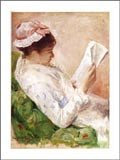 The Nightingale by Kristin Hannah
The Nightingale by Kristin HannahMy rating: 5 of 5 stars
Kristin Hannah begins her tale in 1995, as an ailing, elderly woman tells her son that she will not be parted from a steamer trunk that has stood, unopened, for half a century. He believes it contains mundane mementos that can be repacked into a more compact container. He is wrong. Her son loves her, thinks the old woman, but the dependable, ordinary woman he knows has many secrets.
In 1939, two sisters in France live very different lives. Vianne Mauriac's husband Antoine has just been mobilized. She and their daughter, Sophie, remain in quiet Carriveau. Meanwhile, Vianne's younger sister, Isabelle Rossignol, has been expelled from yet another school in Paris. She briefly works for her father's bookstore, but is forced to flee Paris when the Maginot Line breaks. Along with masses of frightened Parisiennes, Isabelle gets the first hint of the suffering France will endure under the Nazi occupation.
The clashes between the sisters began in their childhood, when their mother died and their father withdrew into alcohol. Even the war does not soften the antagonism between them. Vianne's first concern is the safety of her daughter. She refuses to go along with Isabelle's call to rebel. Vianne believes that the Vichy government will keep them safe, but her hopes shatter one by one.
When the German officer who billets at her home, Beck, informs her that Antoine has been captured, Vianne begins to realize that there are levels of collaboration. Is it wrong for her to cook Beck's meals in exchange for antibiotics, or news from Antoine? Isabelle leaves the village to become a freedom fighter, risking her life to ensure the safety and victory of the Allies.
And what of the old woman? She accepts an invitation to go to paris and attend a ceremony. She is dying, but her son will learn the truth about his family.
Every character, every scene, every flash of history in this novel is a clear look at realities: war, love, courage, and compromise. Vianne and Isabelle embody the experiences and choices that everyday people have to face in wartime. Kristin Hannah has given us a look at the courageous women whose actions may be less-known than those of the heroic men, but who were no less courageous and important.
I received this book from GoodReads in exchange for an honest review. Thank you!
View all my reviews


